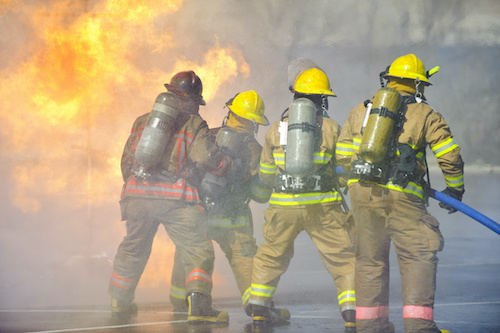03/29/2022
Study Shows Increased Risk of Carcinogenic DNA Damage among World Trade Center Disaster First Responders
 The collapse of the World Trade Center (WTC) on September 11, 2001 resulted in an unprecedented environmental exposure to highly toxic carcinogens and other toxins including pesticides, polycyclic aromatic hydrocarbons, polychlorinated biphenyls, and other hydrocarbons. The simultaneous reduction of a large mass of building material, accompanied by the massive fires, led to the compaction of high concentrations of carcinogens into particulate matter that the first responders were exposed to on 9/11 and the weeks following the disaster. In a recent study published in Nature Medicine (DOI: 10.1038/s41591-022-01708-3), Rutgers Cancer Institute researcher Advaitha Madireddy, PhD and collaborators determined that environmental exposure to this particulate matter resulted in a striking increase in mutations in genes associated with clonal hematopoiesis in WTC first responders as compared to non-WTC-exposed firefighters. Clonal hematopoiesis, or the formation of distinct sub-populations of blood cells by the acquisition of somatic mutations, is associated with an increased risk of blood cancer and inflammatory disorders.
The collapse of the World Trade Center (WTC) on September 11, 2001 resulted in an unprecedented environmental exposure to highly toxic carcinogens and other toxins including pesticides, polycyclic aromatic hydrocarbons, polychlorinated biphenyls, and other hydrocarbons. The simultaneous reduction of a large mass of building material, accompanied by the massive fires, led to the compaction of high concentrations of carcinogens into particulate matter that the first responders were exposed to on 9/11 and the weeks following the disaster. In a recent study published in Nature Medicine (DOI: 10.1038/s41591-022-01708-3), Rutgers Cancer Institute researcher Advaitha Madireddy, PhD and collaborators determined that environmental exposure to this particulate matter resulted in a striking increase in mutations in genes associated with clonal hematopoiesis in WTC first responders as compared to non-WTC-exposed firefighters. Clonal hematopoiesis, or the formation of distinct sub-populations of blood cells by the acquisition of somatic mutations, is associated with an increased risk of blood cancer and inflammatory disorders.
Mechanistic studies in cells exposed to the WTC particulate matter, led by the Madireddy Lab, showed significant accumulation of DNA damage in the exposed cells, at levels comparable to purified genotoxic compound exposures. This was in turn shown to be a direct consequence of stress induced dysregulation of DNA replication dynamics at common fragile sites, characterized by increasing replication fork speeds, likely resulting in an increased burden of DNA damage and high rates of somatic hyper mutations.
Dr. Madireddy is a member of the Genomic Instability and Cancer Genetics Program at Rutgers Cancer Institute and an assistant professor in the Division of Pediatric Hematology/Oncology at Rutgers Robert Wood Johnson Medical School.
07/03/2019
Congratulations Angelica on successfully clearing your Pre-Qualifying Exam!
06/01/2019
Welcome Aris Magoulas, our new Undergraduate Intern
05/20/2019
Welcome Kritika Sharma, our new Undergraduate Intern
04/08/2019
A very warm welcome to our new Graduate Rotation Student, Thushara Nethramangalath!
04/05/2019
A truly special moment… Our very first Graduate Student, Angelica Barreto-Galvez, has joined the lab to pursue her doctorate in Biomedical Sciences!
03/05/2019
The Madireddy Lab is growing, we have now recruited our very first Postdoctoral Fellow. A warm welcome to Dr. Angelo Mandarino.
02/11/2019
Welcome to Anam Shaikh, our newest undergraduate intern
02/11/2019
A very warm welcome to Angelica Barreto, a new graduate student who is doing her PhD rotation in our lab.
01/11/2019
The lab is now funded by the American Cancer Society Pilot Grant.
11/01/2018
A warm welcome to Sourabh Prakash Mudakannaver and Priyanka Tiwari, the newest members of our lab.
10/25/2018
The National Heart, Lung and Blood Institute has funded the Madireddy Lab’s R00 application
10/11/2018
The Madireddy lab is officially open!!!

